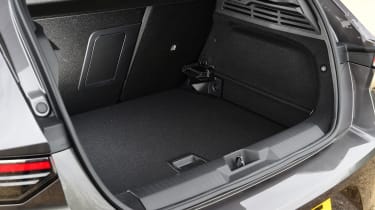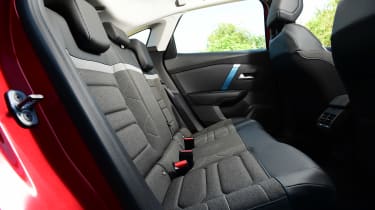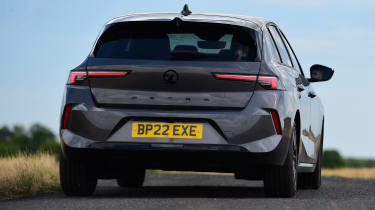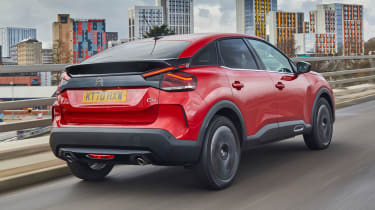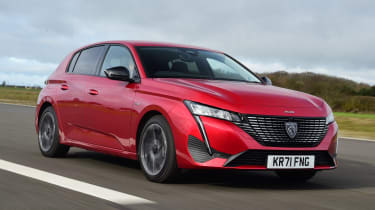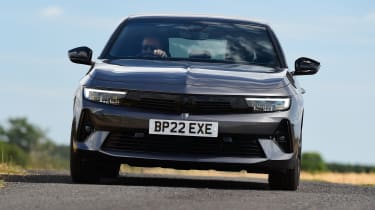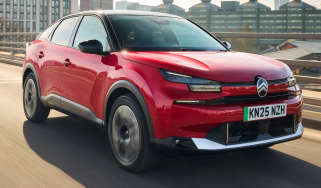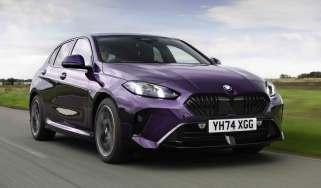Vauxhall Astra vs Peugeot 308 vs Citroen C4: rivals comparison
The Vauxhall Astra, Peugeot 308 and Citroen C4 are three family hatchbacks under the same parent-company – but how do their specs compare?
The Vauxhall Astra family hatchback has been around for over forty years and is now in its eighth generation. It’s the first version of the Astra to be designed and built under the brand’s new parent company known as Stellantis, which also owns the Peugeot and Citroen brands.
A family hatchback needs to be practical enough to fit the kids and accommodate a spacious boot, be economical to run, comfortable to ride in, easy to drive, reliable and affordable to buy.
The Peugeot 308 and Vauxhall Astra are both based on the same platform, meaning they share much of the same technology. The Citroen C4 makes use of a different platform, so it’s the outsider here. The latest iteration of the C4 also marks a style-shift that leans more towards that of a high-riding crossover than the compact hatchback it was before. That said, all three cars compete in this fiercely competitive class with their own take on what a family hatchback should be.
 The top 10 best family cars 2025
The top 10 best family cars 2025
All three are offered as conventional petrol and diesel models, but there are plug-in hybrid models currently available for the Astra and 308, with the fully electric Astra-e and e-308 in the pipeline for a 2023 release. The Citroen C4 is currently also offered as a fully-electric model, known as the e-C4.
But which one should you buy? Read on for our specs comparison of the three cars in the areas that matter most to buyers of family hatchbacks…
Which has the biggest boot?
The Vauxhall Astra has a fairly large boot for its class, with 422 litres of space with the rear seats left up and 1,339 litres when folded down. Naturally, the closely-related Peugeot 308 isn’t far off this, with a seat-up boot space of 412 litres which increases to 1,323 litres when folded down.
To accommodate an additional battery, the plug-in hybrid models have reduced boot space compared to the petrol and diesel models - that’s 352 litres (1,268 litres with seats folded) for the Astra PHEV and 361 (1,271 litres with the seats folded) for the 308 PHEV – so the two models are quite evenly matched across the board.
 Top 10 cars with the biggest boots
Top 10 cars with the biggest boots
The petrol and diesel Citroen C4 falls behind with its 380-litre boot (it’s slightly hampered by a sloping rear roofline.) Impressively, though, the boot size is identical to this in the fully electric version. This increases to 1,250 litres with the seats folded down.
If your priority is boot space, then the obvious choice is between the petrol or diesel Astra or 308, but if you want an electrified model that doesn’t compromise on boot space, the e-C4 might be the right choice.
Which has the most passenger space?
The downside to the Vauxhall Astra and Peugeot 308’s large boots is that rear passenger space is slightly compromised. While both will be able to accommodate most people, legroom and headroom is quite tight in both cars, which could make longer journeys uncomfortable for taller passengers.
The Citroen C4 does somewhat better in this regard – despite its sloping roofline, it offers plenty of space for at least four six-foot-tall adults and a smaller passenger in the middle. If you intend to use your car for the school run or regularly ferry passengers around, the C4 is likely to appeal to you more.
Which is the most economical?
All three cars should be pretty cheap to run, but the choice between them largely depends on usage. The plug-in hybrid options are welcome additions to the Astra and 308’s line-ups, allowing owners to do 40 and 37 miles respectively on electric power alone from a full charge, which should keep costs down while keeping the versatility of a petrol engine for longer journeys when you need it. They (alongside the all-electric e-C4) also offer the cheapest BiK rates for company-car drivers. That said, even the conventional engine options shouldn’t cost the earth to run.
 Top 10 best cheap-to-run cars 2025
Top 10 best cheap-to-run cars 2025
In manual guise, the 1.2-litre petrol Astra is capable of over 50mpg, and the automatic version is smoother to drive with a negligible effect on fuel economy. These figures are roughly the same for the Citroen C4 and the Peugeot 308 (only available as an auto), given that the cars share the same engines, although the 308’s mpg figures are slightly better. In the real world, though, all three petrol models should be just as economical as each other.
The diesel versions all also use the same 1.5-litre units which get an mpg figure of around the mid-60s. When used in the Citroen C4 in six-speed manual guise, though, you’ll get around 5mpg more than the Astra and 308, but again this depends on driving style. A diesel will be best suited to those doing long trips in motorway conditions and isn’t the best option for short trips around town.
For that, your best bet is the electric version of the C4. The e-C4 has an official range figure of up to 219 miles – that’s not terribly impressive for a modern EV, but it is exempt from road tax as a result. With most drivers doing lots of short trips with time to charge between them, and the e-C4’s cheap price (for an EV) it’s a good option.
If you’re dead set on going fully electric and don’t want to wait for the upcoming electric Astra and 308 models, the Citroen e-C4’s price is competitive. The C4 is also the cheapest petrol or diesel of the three to buy, too. For plug-in hybrid versatility the Vauxhall Astra is slightly cheaper than the Peugeot 308, but the Astra can suffer from a steeper loss of value over the years. It’s worth looking at finance options between the Vauxhall and the Peugeot to work out which will be cheaper over the long term.
Which is the best to drive?
The Astra is more fun to drive than ever before. It’s not quite a hot hatch, and doesn’t quite top other rivals like the Mazda3 and Ford Focus, but it feels agile and willing. It’s best specified with the automatic gearbox which is smoother than the manual. Unfortunately its sporty character means it can occasionally jolt passengers, so it’s not the most comfortable of the three to ride in.
Citroen has long set out to be the last name in comfort, and that’s true of the C4, too. The high-riding hatchback sits on Citroen’s Progressive Hydraulic Cushion suspension, which is designed to iron out bumps in the road, and is pretty successful. On the other hand, the C4’s steering is vague and light, and there’s a fair bit of body lean in corners, so it won’t please avid drivers.
The Peugeot 308 sits somewhere between the Astra and C4, with a slight lean towards comfort. It’s not the most exciting to drive, but offers more feel than the C4 and a touch more comfort than the Astra.
Which should you buy?
The choice between the Vauxhall Astra, Peugeot 308 and Citroen C4 largely depends on preference. The Citroen C4 is a left-field choice for lovers of its quirky looks and cheap entry-level price tag. The Peugeot 308 is the most upmarket of the three, but it has a less engaging drive than the Astra and isn’t as comfortable as the C4. The Vauxhall Astra still does everything it always has for families – it’s practical and economical but now it’s also good-looking and fun-to-drive, making it a great all-rounder. The plug-in hybrid version is a great company-car choice, too. If you can get a great finance deal on an Astra, the decision will be made even easier.
If you're looking for a little more practicality and a higher driving position, check out our list of the best family SUVs...
Recommended
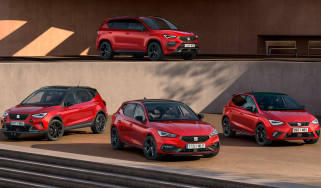
SEAT releases new Black Edition models with sportier styling
Most Popular

New Smart #5 Brabus is a 637bhp far cry from the brand’s city car past

Best car leasing deals 2025: this week’s top PCH offers
Tips & advice

Car dashboard warning lights: what does each symbol mean?

Electric car charging stations: public networks, charger types, apps and maps



